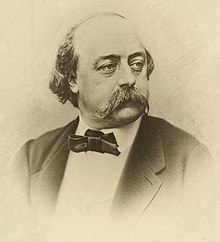Gustave Flaubert | |
|---|---|
 Flaubert c. 1865 | |
| Born | 12 December 1821 Rouen, Normandy, Kingdom of France |
| Died | 8 May 1880 (aged 58) Croisset (Canteleu), Rouen, French Third Republic |
| Resting place | Rouen Monumental Cemetery |
| Occupation | Novelist |
| Genre | Fiction |
| Literary movement | Realism, romanticism |
| Notable works | |
| Signature | |
Gustave Flaubert (UK: /ˈfloʊbɛər/ FLOH-bair, US: /floʊˈbɛər/ floh-BAIR;[1][2] French: [ɡystav flobɛʁ]; 12 December 1821 – 8 May 1880) was a French novelist. He has been considered the leading exponent of literary realism in his country and abroad. According to the literary theorist Kornelije Kvas, "in Flaubert, realism strives for formal perfection, so the presentation of reality tends to be neutral, emphasizing the values and importance of style as an objective method of presenting reality".[3] He is known especially for his debut novel Madame Bovary (1857), his Correspondence, and his scrupulous devotion to his style and aesthetics. The celebrated short story writer Guy de Maupassant was a protégé of Flaubert.
- ^ Wells, John C. (2008). Longman Pronunciation Dictionary (3rd ed.). Longman. ISBN 978-1-4058-8118-0.
- ^ Jones, Daniel (2011). Roach, Peter; Setter, Jane; Esling, John (eds.). Cambridge English Pronouncing Dictionary (18th ed.). Cambridge University Press. ISBN 978-0-521-15255-6.
- ^ Kvas, Kornelije (2020). The Boundaries of Realism in World Literature. Lanham, Boulder, New York, London: Lexington Books. p. 159. ISBN 978-1-7936-0910-6.